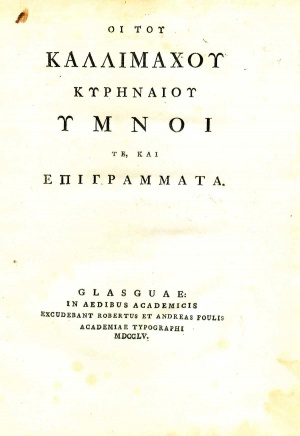Hoi tou Kallimachou Kyrenaiou Hymnoi te Kai Epigrammata
by Callimachus
| Hoi tou Kallimachou Kyrenaiou Hymnoi te Kai Epigrammata | |
|
Title page from Hoi tou Kallimachou Kyrenaiou Hymnoi te Kai Epigrammata, George Wythe Collection, Wolf Law Library, College of William & Mary. | |
| Author | Callimachus |
| Published | Glasguae: Excudebant Robertus et Andreas Foulis, academiae typographi |
| Date | 1755 |
| Language | Greek with Latin preface |
| Pages | vii, [1], 75, [1] |
| Desc. | Folio (22 cm.) |
| Location | Shelf H-2 |
Callimachus (310/305 BCE–240 BCE) was a Greek poet and scholar from the Hellenistic Age. He was born in Cyrene, North Africa and died in an unknown location. Callimachus had the extraordinary honor of being commissioned by Egyptian King Ptolemy II to catalogue all the books in the Library of Alexandria. His completed catalogue contained 120 volumes. The only intact poetry which survives to this day is Callimachus’s six Hymns and sixty-one short epigrams. The remainder of Callimachus’ surviving poetry is in fragments, much on papyri and therefore likely from his time in Alexandria.[1] Notable among the prose completed by Callimachus are the aforementioned catalogue of the Alexandrian Library and his foundational works on lexicography and pardoxography.[2]
This particular work from Wythe’s library contains the complete hymns and epigrams of Callimachus. The Hymns somewhat mirror the famous “Homeric Hymns,” though Callimachus did not intend his to be performed. They were meant to be read to, or recited for, an audience interested in narrative. [3] The hymns to Zeus, Artemis and Delos highlight the gods’ birth and virtues, while those to Apollo, Athena and Demeter are dramatic “imagined ritual[s]” [4] Callimachus’s Epigrams, on the other hand, cover a wide variety of “literary, erotic, dedicatory, and sepulchral themes.”[5]
Evidence for Inclusion in Wythe's Library
Listed in the Jefferson Inventory of Wythe's Library as "Callimachus. Gr. fol. Foul." This was one of the books kept by Thomas Jefferson. He later sold a copy to the Library of Congress in 1815, but it no longer exists to verify Wythe's prior ownership.[6] The Foulis Press only printed one title by Callimachus, in 1755: Hoi tou Kallimachou Kyrenaiou Hymnoi te Kai Epigrammata.[7] Both the Brown Bibliography[8] and George Wythe's Library[9] on LibraryThing include the Foulis publication. The Wolf Law Library purchased a copy of the same edition.
Description of the Wolf Law Library's copy
Bound in contemporary, or near contemporary, calf with gilt rules to boards. Spine has five raised bands defining compartments with gilt amphoras and includes a red morocco label with gilt lettering. Purchased from Black Swan Books, Inc.
Images of the library's copy of this book are available on Flickr. View the record for this book in William & Mary's online catalog.
See also
References
- ↑ "Calli'machus” in The Oxford Companion to Classical Literature, ed. by M.C. Howatson (Oxford: Oxford University Press, 2011).
- ↑ "Callimachus" in Oxford Dictionary of the Classical World, ed. by John Roberts (Oxford: Oxford University Press, 2007).
- ↑ "Calli'machus” in The Oxford Companion to Classical Literature.
- ↑ "Callimachus" in Oxford Dictionary of the Classical World.
- ↑ Ibid.
- ↑ E. Millicent Sowerby, Catalogue of the Library of Thomas Jefferson (Washington, D.C.: The Library of Congress, 1952-1959), 4:474 (no.4396).
- ↑ Philip Gaskell, A Bibliography of the Foulis Press, 2nd ed. (Winchester, Hampshire, England: St Paul's Bibliographies, 1986), 194.
- ↑ Bennie Brown, "The Library of George Wythe of Williamsburg and Richmond," (unpublished manuscript, May, 2012) Microsoft Word file. Earlier edition available at: https://digitalarchive.wm.edu/handle/10288/13433
- ↑ LibraryThing, s. v. "Member: George Wythe", accessed February 27, 2014.
